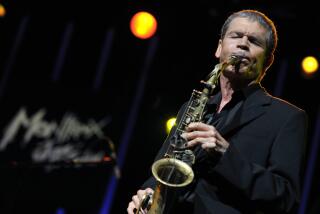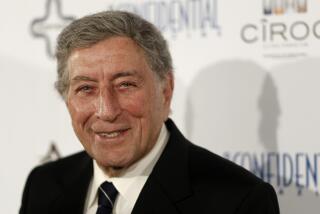Richard Dyer-Bennett; Folk Troubadour and Guitarist
- Share via
Richard Dyer-Bennett, the self-styled troubadour whose lyric tenor voice became a significant instrument during the revival of folk music 40 years ago, has died.
The singer, guitarist, composer, translator and teacher was 78 and died of cancer Saturday at his home in Monterey, Mass.
Although others labeled him a “folk singer,” he referred to himself as a “minstrel or troubadour,” whether writing propaganda songs for the Allies and visiting wounded servicemen during World War II or performing the Schubert song cycles until his health failed.
He appeared across the nation in nightclubs, including New York’s Village Vanguard, where he sang with Woody Guthrie, Pete Seeger and Josh White, and in solo concert appearances at Los Angeles’ Wilshire Ebell Theater.
He toured under the aegis of famed impresario Sol Hurok and in 1944 filled New York’s Town Hall, then an unprecedented crowd for a folk performer.
Dyer-Bennett would introduce himself to audiences as “a minstrel, one who subsists by practicing the art of music.”
He would then dip into his repertoire of 600 songs, which included more than 100 of his own works.
Concerts could range from simple English or American ballads, spirituals, Schubert’s “Die Schone Mullerin,” which he translated as “The Lovely Milleress,” or standard sea chanteys.
Critics praised him for his diction, humor and minimalism, whether he was playing classical guitar or singing cowboy songs.
He said in interviews that his voice was “rather sweet but limited” and that he had succeeded “in spite of my voice rather than because of it.”
Born in Leicester, England, Dyer-Bennett came to the United States in 1925 and studied voice and guitar. He made his concert debut in New York in 1944. In 1970, two years before a stroke limited his guitar playing and forced an end to his personal appearances, he joined the faculty of the State University of New York.
He also wrote articles and books on music and recorded about two dozen albums, many on his own label.
More to Read
The biggest entertainment stories
Get our big stories about Hollywood, film, television, music, arts, culture and more right in your inbox as soon as they publish.
You may occasionally receive promotional content from the Los Angeles Times.










